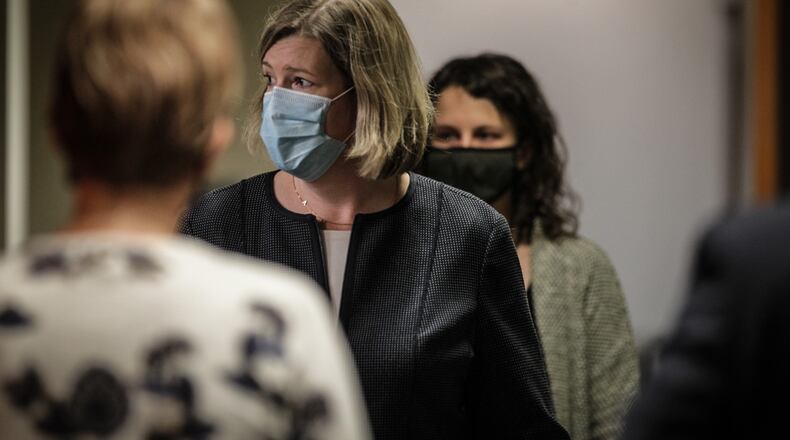Dayton Mayor Nan Whaley’s eighth and final State of the City address this week called on the community to “redouble” its COVID-19 safety efforts and emphasized new and ongoing work to reform police policies, prevent evictions, combat inequality and bring new investment to Black neighborhoods.
In a pre-recorded speech broadcast Wednesday morning, Whaley revealed the city is working on a “pay-to-stay” ordinance, similar to one in Toledo, that would protect tenants from eviction if they pay their back rent, late fees and court costs after eviction proceedings begin.
The mayor, who is not seeking reelection after two terms in office, also said Dayton is one of seven U.S. cities that will receive support from Mastercard to reduce racial disparities. The company vowed to invest $500 million in Black communities in the next five years.
Whaley struck thankful and optimistic tones at times when discussing how the community responded to the pandemic and other hardships and tragedies last year, including the deaths of George Floyd and Breonna Taylor at the hands of police.
She also warned against complacency as vaccines are distributed and the coronavirus public health emergency reaches the one-year mark in Ohio.
She said the end of this crisis is on the horizon, and this is no time for the community to let its guard down.
“I’m often reminded by Dr. (Michael) Dohn that tightrope walkers usually fall in the last three feet of their walk,” she said, referring to the medical director of Public Health ― Dayton & Montgomery County.
Whaley’s 21-minute speech broadcast on TV and online on Wednesday covered topics including health, public safety, inequality and race.
She noted that Daytonwas the first Ohio city to require mask-wearing to curb the spread of disease.
She praised public health for pledging to set aside one quarter of the vaccines it receives to go to West Dayton and Trotwood, as part of efforts to overcome what she called “inequality” in information about and access to vaccinations.
The city is partnering with Accelerator for America and Mastercard to develop strategies for supporting Black entrepreneurs, she said.
Mastercard says it will make investments to provide Black-owned businesses and Black residents access to affordable financial tools and capital, and its commitment includes products, services, financial support and technology.
Mastercard says these efforts will benefit Dayton, Atlanta, Los Angeles, New Orleans, New York City, St. Louis and Birmingham (Alabama).
“As part of these activities the company will bring together identification, financial access and payment functionalities in one place through Mastercard City Key, enabling more than 1 million residents with digital access to essential financial tools and support,” the company said.
Whaley said the criminal justice system is broken, but she is optimistic that this is a real moment of transformation, both in the region and nationwide.
She said the five police reform committees she helped create already have produced major policy changes that will make Dayton safer for both police and residents, while also improving transparency, accountability and trust between officers and community members.
“We have a long way to go to right the many wrongs that have faced our Black neighbors,” she said. “But I feel confident that we are finally on the path.”
Proposed changes include equipping patrol officers with new body-worn cameras, a new de-escalation policy, a new auditor to review internal investigations and a new program that diverts some police calls to a special team of non-police first responders trained to deal with people struggling with mental health.
Whaley, who created an eviction task force in 2019, said the city will introduce pay-to-stay legislation to allow tenants to remain in their homes if they pay the back rent and other fees and legal costs they owe.
“Currently, if a tenant is late with their rent but provides payment once their landlord begins eviction proceedings, the landlord can still continue to push them out,” she said.
Generally, pay-to-stay rules prevent landlords from evicting tenants for nonpayment of late rent when the tenant tenders all rent and reasonable late fees to the landlord, said Debra Lavey, senior attorney for Advocates for Basic Legal Equality in Dayton, which helps with eviction legal services.
Ohio may be facing the most severe housing crisis in its history, Lavey said, and most tenants in eviction court are low-income, black female heads of household with children.
“City of Dayton’s efforts have provided additional tenant protections and reduced the financial burden on tenants,” she said. “A pay-to-stay law will provide additional housing stability for families.”
About the Author



